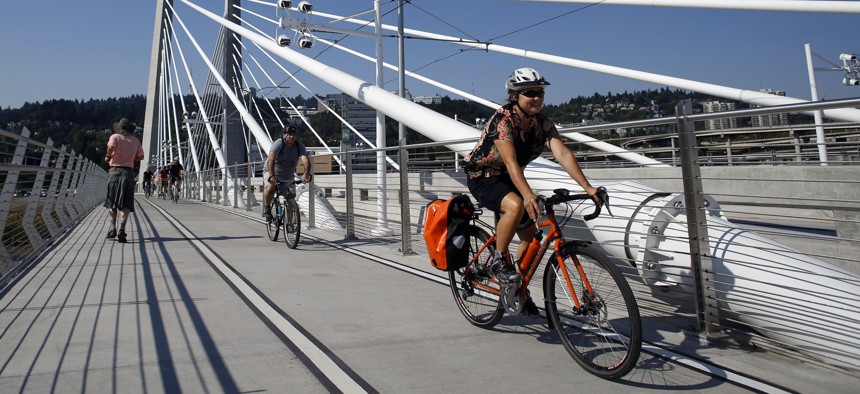Connecting state and local government leaders
College towns and big coastal cities top our ranking of the metros where it’s easiest to live without a car.
Going car-free is a definite trend. Cars are expensive to own, maintain, and insure. They take a heavy toll on the environment. And not having a car can say something about a person’s identity.
But being able to go without a car isn’t just a matter of personal commitment—it depends a lot on where you live. Some cities are denser, have much better transit, and are more walkable and bike-able than others.
My colleague Charlotta Mellander and I have developed a Metro Car-Free Index. It’s based on four key variables: the share of households that don’t have access to their own vehicle, the share of commuters who take transit to work, the share of commuters who bike to work, and the share of commuters who walk to work. All of the data we used are from the American Community Survey’s five-year estimates for 2017, and they cover all 382 U.S. metropolitan areas.
We classified metros into four size groups: large metros (with more than 1 million people); medium-sized metros (between 500,000 and 1 million people); small metros (250,000 to 500,000 people), and very small metros (population less than 250,000). Mellander also ran a basic correlation analysis to identify the key characteristics associated with car-free metros. As usual, I remind readers that such correlations do not imply causation, but simply point to associations between variables.
The map below, by CityLab’s David Montgomery, charts the broad pattern across all U.S. metros. Note the wine- and rust-colored metros where people are most able to go car-free. The two largest car-free clusters are those stretching down the Northeast’s Acela corridor, from Boston to Washington, D.C., and the Pacific Northwest, from Seattle to Portland. By contrast, much of the Deep South is highlighted in light orange or pink, signifying much higher car dependency.
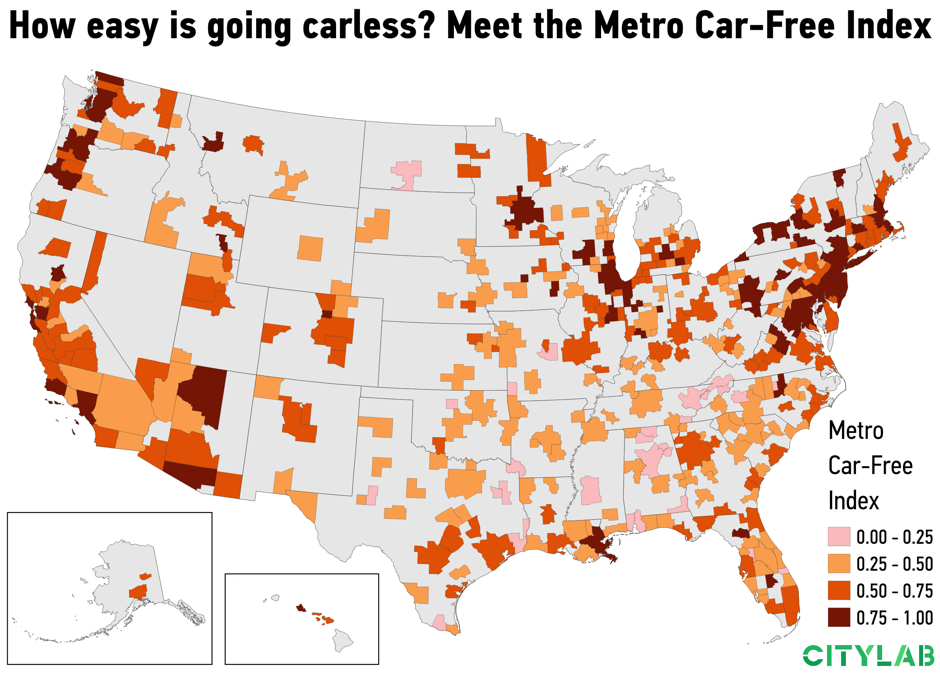
San Francisco tops the ranking of large metros in the index, followed by Boston and New York. What’s interesting is that the New York metro leads on three of the four variables of the index. It has far and away the largest share of households who report no access to a vehicle, 22 percent. (That’s more than three times the share in both San Francisco and Boston.) New York is also the clear leader in the share of commuters who use transit to get to work, with more than 30 percent, almost double San Francisco’s share. And it has the edge on the share of commuters who walk to work, roughly 6 percent.
But New York has a far smaller share of commuters who bike to work. It even fails to crack the top 10 on this metric, coming 101st out of 382 metros, or 22nd out of 53 large metros.
Top 10 Car-Free Large Metros
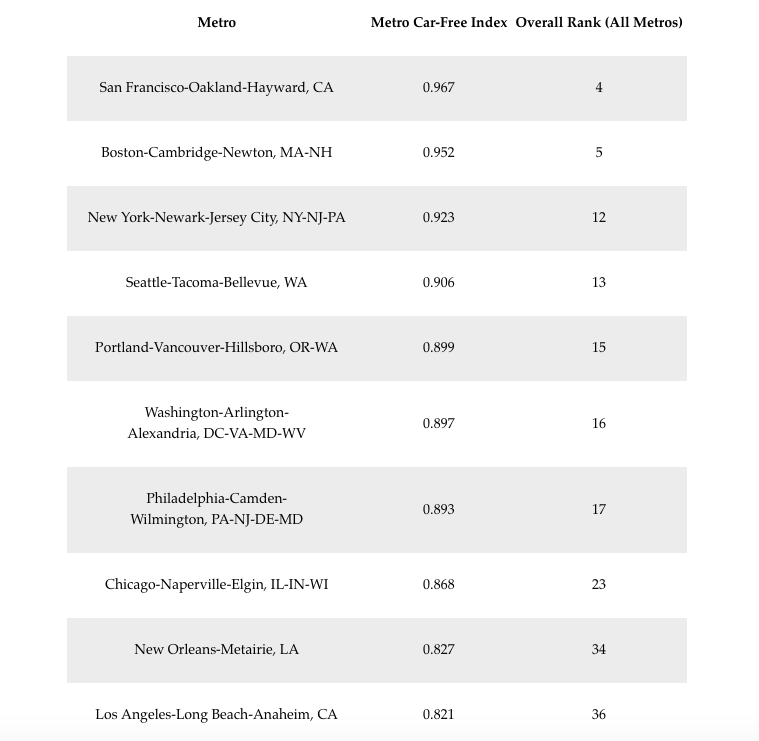
Rounding out the top 10 are Washington, D.C., Philadelphia, Chicago, Seattle, Portland, and (perhaps surprisingly) Los Angeles. These are mainly larger, denser, and more congested metros, many of which have very expensive housing prices.
On the flip side, the large metros where it is hardest to go without a car are mainly younger, more sprawling places in the Sunbelt, such as Birmingham, Nashville, Raleigh, Dallas, Oklahoma City, and Charlotte. With the exception of Dallas, these are not-so-large metros with less traffic congestion, where it is relatively easy to get around by car.
Bottom 10 Car-Free Large Metros
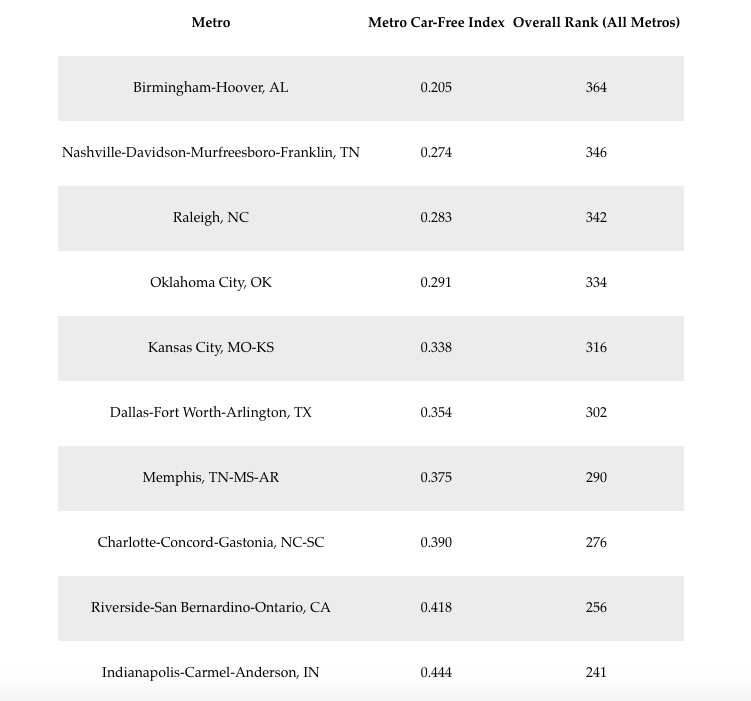
The pattern changes quite a bit when it comes to mid-sized and smaller metros. Here, the size or even age of the area plays little role. College towns dominate these lists.
Top 5 Car-Free Medium-Sized Metros
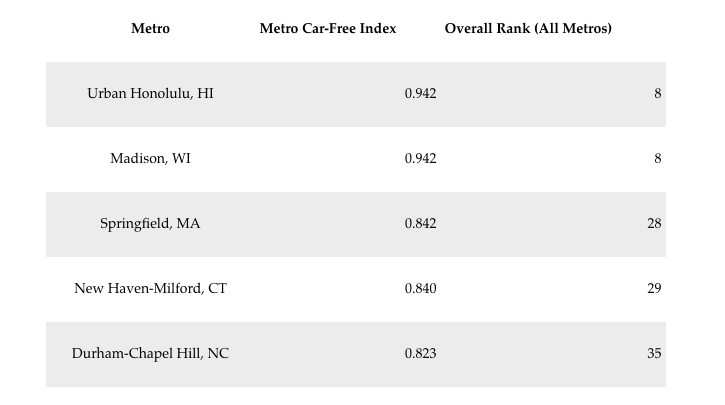
Honolulu tops of the list of best car-free metros with between 500,000 and 1 million people. But it’s an outlier, a reasonably large, dense, and expensive metro. Most of the leading places are college towns: Madison (University of Wisconsin); New Haven (Yale University); Durham–Chapel Hill (Duke University and the University of North Carolina).
The same is true of smaller metros, those with between 250,000 and 500,000 people. The car-free leaders here are mainly college towns, such as Ann Arbor (University of Michigan), Eugene (University of Oregon), and Gainesville, Florida (University of Florida). Also appearing in the top 10 are Boulder (University of Colorado), South Bend, Indiana (Notre Dame), and Lansing (Michigan State University).
Top 5 Car-Free Small Metros

The pattern is even more pronounced for the smallest metros, with populations below 250,000. This list is a “who’s who” of college towns, including Ithaca, New York (Cornell University and Ithaca College), State College (Penn State), and Champaign-Urbana, home to the University of Illinois. Those three places actually top the index nationwide, besting San Francisco, Boston, and New York.
Top 5 Car-Free Very Small Metros
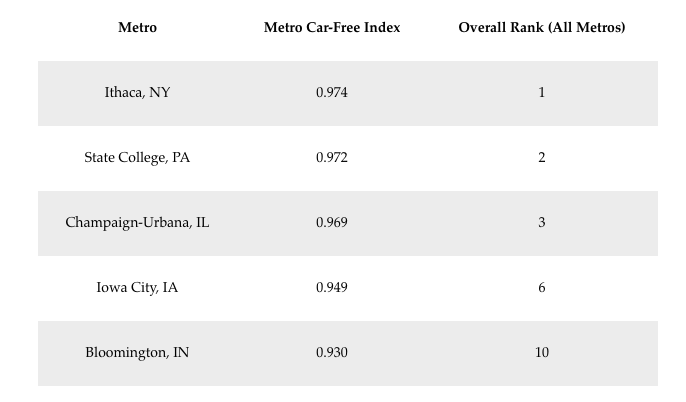
What are the characteristics that distinguish car-free metros? The popularity of living without a car is only weakly related to population and density (with correlations of around .2). Going car-free is much more closely related to America’s economic and political divides.
Living in a car-free metro is positively associated with both the share of adults who are college graduates (.54) and the creative-class share of the workforce (.48), and negatively associated with the blue-collar working-class share of the workforce (.45). Car-free living has an even stronger positive association with living in a liberal metro, and is negatively correlated with living in a conservative metro, based on votes for Hillary Clinton (.56) and Donald Trump (-.62) in the 2016 presidential election.
America’s economy and culture remain car-dependent. So ditching your own car rarely means never getting into a car, as the tech journalist Kara Swisher described in a recent New York Times column about her decision to get rid of her car. Like many people, Swisher still uses car-sharing services or rentals from time to time.
Ironically, despite the expense of owning a car, going carless in America often requires having money. It helps if you can afford living close to where you work or near good transit, or in a walkable neighborhood with most of life’s necessities close by.
Richard Florida is a co-founder and editor at large of CityLab and a senior editor at The Atlantic.

NEXT STORY: The Problem With Switching to Electric Cars
